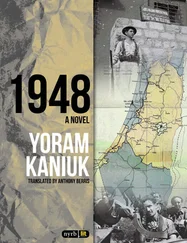Joseph and Rachel asked for compassion, but she banished them. I'll bear the hatred that hates the only love I could have had, she said. There were pogroms then and people hid in their houses and Nehemiah went out with his group to defend the lives of the people and they were forced into exile for fear of the authorities and Rebecca followed him, and after the ransom was paid, people said: Something new happened to the Jews, and Rebecca laughed, it was because of her hatred that those things had come, and then Rebecca and Nehemiah got married with a haste caused by the time and the dread. Hasids again went up to the roofs and shouted to God, Secret Glory died choked by a drunken Cossack who beat up a Jew, and two wrinkled old women died holding onto one another in terror. A house was burned and the smell of its smoke filled the street and a child was thrown into the fire. Only relatives were invited to the wedding of Rebecca and Nehemiah, there were no musicians, people were busy fixing their destroyed houses, and Nehemiah told them: Why fix what will be destroyed again, go to the Land of Israel, and they laughed at him. But Rebecca's father came at night, hugged his daughter, touched Nehemiah's arm, and said: Maybe that's a vision of death, maybe this nation can't be revived, but go and erect a house for me there. Rebecca's mother stood on the side and didn't say a word. Something deep and old rested on her beautiful face. They had to slip out of the city at night. An old carter took them over the border. The new arrest warrant against Nehemiah had been delayed in a tavern where a clever Jew deceived the officials with cheap brandy. The Ukrainian who wanted to reward Rebecca for his melancholy kept the drunk until morning. After wandering a lot, Rebecca and Nehemiah came to the city of Trieste. Rebecca went to the coffinmaker and told him of the coffin she wanted for her husband and the splendid coffin of her husband, when her stomach swelled up, she took with her on the ship. As the distance between her and Joseph grew, she could love him like a shadow blended with who she once was. Now Rebecca Schneerson was taken to the land she didn't want to go to with a fetus in her belly and a husband in a coffin.
Tape / -
The journey to Jaffa took ten days. The sea was strong, and near Crete, the stairs broke and the sailors stretched ropes along the moldy corridors, and in the crowded halls people lay groaning. Rebecca sat on deck and knitted a scarf. The waves would break at her feet and didn't touch her. A Russian officer, splendidly dressed, brought her a cup of tea and said: For a brave and beautiful lady. She looked through him and saw the breakers stopping at what could have been her steps. Twice a day she would go down to the belly of the ship and sit at her husband's coffin and then would go up and sit on deck. Looking with meticulous indifference at the Christian pilgrims, the Hasids in black caftans, shouting and screeching, and the Pioneers who would recite the moldy poems of Joseph Rayna and long for a place they had never been.
The morning they left Alexandria for Jaffa, the storm stopped. The seagulls danced dances woven of ancient and stylized geometry over the two masts where endless banners in various colors waved in the wind. Rebecca wondered if the seagulls didn't see an ancient Phoenician ship now, and then, as she was stroking her belly, she wanted to sacrifice to the god still remembered only by those eternal birds. But the times of the birds and the times of the passengers were different. The phenomenon of the ship would pass against the eternity of the celestial fabric and the sight only filled her with yearning for another reality, for a place you don't long for and where you don't return. America, discovered by her grandfather's grandfather, Rabbi Kriegel, on his journey from Hebron, was the realm of her dreams when she went to Nehemiah's house and asked him to marry her. She wanted to be reborn. Even though she had never seen Rabbi Kriegel, she remembered him as a disillusioned man who married Rebecca Sweet Charity to her dead fiance. Thinking about America, she understood the Hasids and pilgrims coming to the Land of Israel to visit the graves of the dead, but she couldn't forgive the Pioneers for the insolence fostered in them by yearnings as if that place hadn't died two thousand years ago. The seagulls were an ancient sign that the time of the Phoenicians and the raging gods still existed despite the dreams of the Pioneers. The birds tried to bribe the sky with their satanic and delicate flying but her husband's coffin was launched precisely because of the hidden wisdom of the seagulls. The sea grew calm. Her belly seemed too heavy. The eternal glass of tea brought her by the Russian officer was too sweet and in front of her was the saltiness of the water that almost touched her feet, but stopped just before her. The shore approached. The pilgrims sang excited songs whose words they read in ancient books smelling of dank gray they held in their quaking hands. The Pioneers donned berets, white shirts, and coats. Wrapped in bliss they looked toward the light strewn on the long sandy shore. When the ship dropped anchor opposite the hill of Jaffa, Rebecca folded the scarf she had knitted, straightened up and stood at the ship's railing, and her gigantic belly touched the steel cables. In the distance, boats were seen rowing toward the ship. In the boats sat sailors with thick mustaches and big bodies. The sky was clear and waves struck the sides of the ship that dropped its anchors and hooted. The light was clear but shrouded with a certain stiffness, which even now, on the first of January, in the year nineteen hundred, looked both pungent and clear. Rebecca looked at the hill. She saw mosques and churches, and beyond the mosques and the churches sands stretched to the horizon. A caravan of camels raised clouds of dust and a few distant treetops sweetened the bitterness of the yellow desolation. A smell of lemons and sea salt rose to her nose. She felt no sense of returning home. Never had she felt she had come to a more foreign place.
The sailors carefully put her down into the boat. Then the coffin was brought down and placed next to her. Her swollen belly and her husband in the coffin awed the sailors and they were afraid to look straight into the beautiful face of the woman to whom the Russian officer offered a flower before she was taken down from the ship. She despised their fear of the evil eye but in her heart she appreciated their pretense of indifference. She always loved events devoid of value that were played with too much importance. Someday she would tell Boaz that in the end a state is a flag with a land.
The sailors rowed vigorously toward the port and when she came to the shore, a Turk in a green uniform with a red tarboosh was waiting there, and behind him stood a barefoot Arab lad holding a somewhat torn parasol over the head of his master. The Turk was holding a truncheon in his hand and tried to smile at her. He stood in a vacuum strictly preserved by both Turks and Arabs. Wherever he walked, he was surrounded by that reverential vacuum. Behind him, near the wall of the big mosque, sat Arabs smoking narghilas; not far from them stood skinny horses whinnying and stamping their feet. A gigantic pile of oranges was seen, and behind it, against the background of a small shop, two skinned oxen were hung on hooks. The blood poured down to the ground, but because of the blinding light she didn't see the blood. Her slippery jumping made the Turk under the parasol bend down a bit, and he leaned aside with ostentatious exaggeration. He said in Arabic: A beautiful woman for a dead Jew. The Arabs who couldn't come close to him laughed in the niche of the mosque and one of them laughed and started choking. The smoke of the narghilas flowed into them like snakes. The Turk, maybe he thought they were laughing at him, hit one of the Arabs with his truncheon. The Arab fell, his legs got wound up in each other, and his white tongue twisted out. Two coals sprayed on his dress and somebody crushed a sharp-smelling lemon and put out the sparks. The Arab tried to laugh in his fear but the Turk farted in his face and the Arab swallowed the moldy air, lifted the sole of his foot, showed it to the Turk who was no longer paying attention to him. And he shouted: I'm your sole! And through his lifted foot and the truncheon that very slowly returned from its blow, Rebecca's skirt was visible to the Arab. The Turk withdrew, made room for the beautiful lady, and two barefoot sailors carefully put down Nehemiah's coffin. The Turk said with philosophical restraint, in French: We're born and we die. And he stared at Ebenezer who was still in the sixth month of his gestation.
Читать дальше












